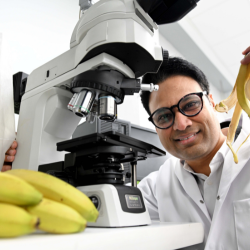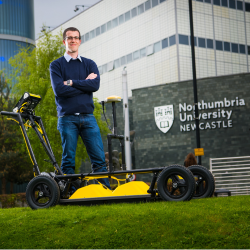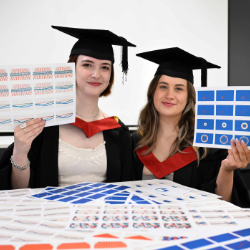-
Study
-
UCAS Clearing 2024
- Clearing Courses
- The Clearing Process
- UCAS Tariff Points
- Clearing 2024 FAQs
- Confirmation
- Clearing Virtual Event
-
Undergraduate
- Search for a Course
- Undergraduate Open Day & Events
- Application Guides
- Northumbria University UCAS Exhibitions
- Foundation Years
- Undergraduate Fees & Funding
- School & College Outreach
- Continuing Professional Development
-
Postgraduate
- Postgraduate Study Degree
- Postgraduate Research Degrees
- Postgraduate Open Days and Events
- Postgraduate Fees & Funding
- Flexible Learning
- Thinking about a Masters?
- Continuing Professional Development
- Change Direction
-
Student Life
- The Hub - Student Blog
- Accommodation
- Life in Newcastle
- Support for Students
- Careers
- Information for Parents
- Students' Union
- Northumbria Sport
-
-
International
International
Northumbria’s global footprint touches every continent across the world, through our global partnerships across 17 institutions in 10 countries, to our 277,000 strong alumni community and 150 recruitment partners – we prepare our students for the challenges of tomorrow. Discover more about how to join Northumbria’s global family or our partnerships.
View our Global Footprint-
Applying to Northumbria
- European Union
- Our London Campus
- Northumbria Pathway
- International Events
- Entry Requirements and Country Representatives
- Regional Offices
-
Northumbria Language Centre
- Faculty Requirements
- Acceptable English Requirements
- Pre-Sessional English and Study Skills
- Academic Language Skills Programmes (ALS)
-
International Fees, Funding & Scholarships
- International Undergraduate Fees
- International Undergraduate Funding
- International Masters Fees
- International Masters Funding
- International Postgraduate Research Fees
- International Postgraduate Research Funding
- International Money Matters
-
Life at Northumbria
- International student support
- Careers
-
International Mobility
- Current Northumbria Students
- Incoming Exchange Students
-
-
Business
Business
The world is changing faster than ever before. The future is there to be won by organisations who find ways to turn today's possibilities into tomorrows competitive edge. In a connected world, collaboration can be the key to success.
More on our Business Services -
Research
Research
Northumbria is a research-rich, business-focused, professional university with a global reputation for academic quality. We conduct ground-breaking research that is responsive to the science & technology, health & well being, economic and social and arts & cultural needs for the communities
Discover more about our Research -
About Us
-
About Northumbria
- Our Strategy
- Our Staff
- Place and Partnerships
- Student Profiles
- Alumni Profiles
- Leadership & Governance
- Academic Departments
- University Services
- History of Northumbria
- Contact us
- Online Shop
-
-
Alumni
Alumni
Northumbria University is renowned for the calibre of its business-ready graduates. Our alumni network has over 237,000 graduates based in 178 countries worldwide in a range of sectors, our alumni are making a real impact on the world.
Our Alumni - Work For Us
What will I learn on this module?
You will learn about the principal features of chromatographic and spectroscopic techniques, including:
? Survey of separation science.
? Fundamentals of HPLC with respect to isocratic and gradient elution, reversed and normal phase separation and detectors.
? Fundamentals of capillary GC with respect to isothermal and temperature programmed elution, selection of column and detectors.
? Theoretical aspects of separation, capacity factors, resolution, theoretical plate height (efficiency), peak tailing and the influence of these parameters on separation.
? Theoretical aspects of modern and traditional sample preparation techniques.
? Overview of spectroscopic methods.
? NMR spectroscopy: basic instrumentation and experimental aspects; Pulse-Fourier Transform methods; spectral appearance and interpretation for 1H and 13C NMR spectroscopy; splitting patterns for common 1st and 2nd order systems; advanced methods; DEPT spectra.
? IR spectroscopy: basic instrumentation and experimental aspects; interpretation and prediction of spectra, vibrational modelling.
? Mass spectroscopy: basic instrumentation and experimental aspects, ionisation techniques; fragmentation patterns, interpretation and prediction of spectra.
? Strategy and practice in structure elucidation.
Laboratory exercises will be used to underpin the theory taught in lectures, develop practical skills and afford hands-on experience of relevant techniques. In addition, there will be in-module assignments allowing you to explore the merits and approaches necessary to solve typical spectroscopic problems.
How will I learn on this module?
You will learn through a combination of lectures, tutorials, laboratory exercises and directed/independent study. Teaching will include the use of interactive workshops devoted to data interpretation and problem solving. Directed learning will take the form of preparation for the laboratory work and practice in the interpretation of spectra (IR, NMR and MS) via problem solving exercises. Independent learning will enable you to enhance your understanding of chromatographic and spectroscopic methods of analysis. Laboratory classes and workshops will be used to reinforce material covered in the lecture programme and to gain valuable hands-on and interpretation experience.
How will I be supported academically on this module?
All teaching materials will be available via the module eLearning Portal site (Blackboard Ultra). Further reading materials will be recommended and provided via the library online reading list. Academic staff will be accessible through the open-door policy to support your independent learning. Feedback (written) will be provided for all assessments. Past exam papers will be provided to assist your learning / revision process.
What will I be expected to read on this module?
All modules at Northumbria include a range of reading materials that students are expected to engage with. The reading list for this module can be found at: http://readinglists.northumbria.ac.uk
(Reading List service online guide for academic staff this containing contact details for the Reading List team – http://library.northumbria.ac.uk/readinglists)
What will I be expected to achieve?
Knowledge & Understanding:
1. You will be able to understand the fundamental theory and describe the basic instrumental aspects of analytical separation and spectroscopic techniques
2. You will be able to choose and perform appropriate analytical procedures for the separation of the components of a mixture or the structural elucidation of unknown compounds.
Intellectual / Professional skills & abilities:
3. You will be able to apply theoretical knowledge to resolve relevant analytical problems of moderate complexity.
4. You will be able to interpret experimental data from selected analytical techniques.
Personal Values Attributes (Global / Cultural awareness, Ethics, Curiosity) (PVA):
5. You will be able to explore your curiosity in modern methods for chemical analysis.
How will I be assessed?
You will be assessed by two components:
• Component 1: Unseen written end of semester exam (60% 3 hours) (MLO 1, 3, and 5)
• Component 2: Coursework (40%) containing 2 sub-components: lab reports (20%); online open-book problem test (20%) (MLO 1-5)
Feedback:
All marked and annotated exam scripts and lab reports will be returned with tutor feedback following the internal moderation process. The online tests will utilise an ESAF approach.
Pre-requisite(s)
N/A
Co-requisite(s)
N/A
Module abstract
This module takes in two vital strands of industry-based and research-based technology and skills development in the areas of separation science/chromatography and spectroscopy. These two instrument oriented topics are a bedrock of analytical chemistry and synthetic chemistry; no student can fulfil their potential in chemistry without a solid foundation in these areas. The topics lend themselves to a problem solving approach so, although there will be a formalised lecture component, much of the emphasis is on problem-solving/detective work and experimentation/analysis, which are also key academic skills that employers value.
This module will be delivered by a combination of lectures, laboratory exercises and interactive sessions devoted to data interpretation and problem solving. The principal features of chromatographic and spectroscopic techniques will be described. Laboratory exercises will be used to develop practical skills and afford hands-on experience of relevant techniques. Assessment is via laboratory reports, on-line quiz/test and an end of semester examination.
Course info
UCAS Code F115
Credits 20
Level of Study Undergraduate
Mode of Study 3 years Full Time or 4 years with a placement (sandwich)/study abroad
Department Applied Sciences
Location City Campus, Northumbria University
City Newcastle
Start September 2024 or September 2025
All information is accurate at the time of sharing.
Full time Courses are primarily delivered via on-campus face to face learning but could include elements of online learning. Most courses run as planned and as promoted on our website and via our marketing materials, but if there are any substantial changes (as determined by the Competition and Markets Authority) to a course or there is the potential that course may be withdrawn, we will notify all affected applicants as soon as possible with advice and guidance regarding their options. It is also important to be aware that optional modules listed on course pages may be subject to change depending on uptake numbers each year.
Contact time is subject to increase or decrease in line with possible restrictions imposed by the government or the University in the interest of maintaining the health and safety and wellbeing of students, staff, and visitors if this is deemed necessary in future.
Useful Links
Find out about our distinctive approach at
www.northumbria.ac.uk/exp
Admissions Terms and Conditions
northumbria.ac.uk/terms
Fees and Funding
northumbria.ac.uk/fees
Admissions Policy
northumbria.ac.uk/adpolicy
Admissions Complaints Policy
northumbria.ac.uk/complaints














